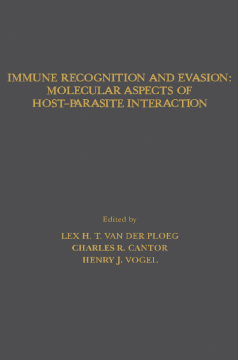
BOOK
Immune Recognition and Evasion: Molecular Aspects of Host–Parasite Interaction
(2012)
Additional Information
Book Details
Abstract
Immune Recognition and Evasion: Molecular Aspects of Host-Parasite Interaction reviews recent advances in understanding the genetic basis of host-parasite interactions, with emphasis on antigenic epitopes, the genetics of parasites, the molecular mechanisms of immune recognition and evasion, and the way that cytokines and hormones act on host-parasite interactions.
Organized into four parts encompassing 25 chapters, this volume begins with an overview of the genomic organization of the T cell receptor genes and the contribution of non-B DNA structures to switch recombination in immunoglobulin genes. It then discusses signal transduction by class II molecules encoded by the major histocompatibility complex la and the biological consequences of this process; allelic polymorphism of HLA class II antigens and its connection to the molecular basis of autoimmunity; mimicry between HLAB27 and bacteria; and genetic control of susceptibility to helminth infection. The reader is also introduced to recognition of protein antigens by antibodies; recognition of influenza antigens by class I-restricted cytotoxic T lymphocytes; the biochemical basis of cachexia of infection; mechanisms of antigenic variation in Plasmodium; and rational design of trypanocidal drugs.
Geneticists and molecular biologists will gain valuable information from this book.
